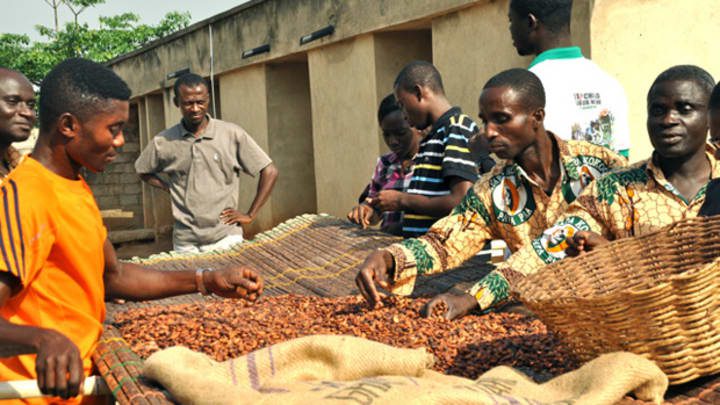The Chairman of Assiman Cocoa Farmers’ Cooperative and Marketing Union Limited (AMCUFL), Theophilus Tamakloe, says cocoa sector Certification Schemes have shown limited impact on addressing livelihood issues, as farmers remain in poverty.
The farmer union leader explained that premiums paid by certification schemes to farmers remain unrealistically low.
BFT Online reports that Mr Tamakloe who made the observation while commenting on a study commissioned by AMCUFL on “Addressing Cocoa Land use and Impact on Deforestation,” also regretted that the standards by certification schemes lack equivalent criteria for forest protection.
Despite these limitations he said, some companies are utilizing certification schemes that seek to promote responsible practices while others are relying on their own community programmes in combination with certification, to support climate-smart practices of smallholder farmers.
Mr Tamakloe indicated that there are certification schemes, which have emerged to address environmental and socio-economic issues related to cocoa, including biodiversity loss and forest conversion.
The AMCUFL boss, therefore, called for effective and efficient policy guidance by stakeholders to aid zero-cocoa deforestation commitments.
The Chairman was of the view that “even if the certification schemes all had strong forest protection, they still contain limitations.”
These he noted create sourcing complications for companies that use certified cocoa purchases as their strategy to reduce deforestation.
He continued that deforestation for cocoa is not sustainable for the industry in a changing climate and companies have taken some of the first steps to improve the social and environmental footprint of their operations.
According to Mr Tamakloe, a public-private partnership will be required through a collective transformation which is more efficiently achieved through increased strategic alignment.
Sustainable finance he added is also necessary and the collective efforts by financial institutions, producer and consumer country governments as well as supply chain companies will be required to develop effective financial mechanisms that work for local producers to replant their cocoa farms to increase productivity without clearing the forests.
“The key strategies for operationalizing zero-deforestation cocoa includes public-private cooperation through increased strategic alignment,” he said.
He mentioned that there is a need for a policy in place that emphasizes cocoa farm restoration and regeneration.
“As part of efforts in supporting sustainable intensification forest recovery and protection interventions backed by strong safeguards to this policy; interventions to support beneficiaries of climate financing can contribute to emission reductions. In addition, more impact may be possible if research and data collection is with zero-deforestation goals”, he added.
The study on “Zero-Deforestation Cocoa Policy to facilitate effective traceability” was supported by Business Sector Advocacy Challenge (BUSAC) Fund, USAID and DANIDA”.
[wp_quiz id=”3997″]
- Major Ghana Cocoa Region 81% Infected with Bean Disease - July 22, 2024
- Ghana to Delay More Cocoa Deliveries as Supply Crisis Worsens - June 12, 2024
- Cocoa Production Helping Mitigate Climate Change Impact - June 10, 2024
